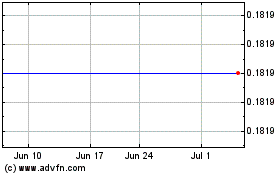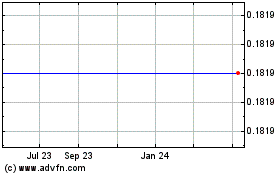Wal-Mart to Stop Selling Welspun India's Egyptian Cotton Sheets -- Update
September 09 2016 - 4:40PM
Dow Jones News
By Sarah Nassauer and Preetika Rana
Wal-Mart Stores Inc. said it would stop selling Egyptian cotton
sheets made by Welspun India Ltd., after its investigation found
the Indian textile giant couldn't guarantee the products were
legitimate.
"Welspun has not been able to assure us the products are 100%
Egyptian cotton, which is unacceptable," Wal-Mart spokeswoman
Marilee McInnis said.
The world's biggest retailer is removing the Welspun products
from U.S. store shelves and Walmart.com. Wal-Mart said it would
offer customers who purchased the products a full refund. It will
donate the sheets currently on shelves.
The move is the latest blow to the Indian textile company after
Target Corp. last month said it was pulling thousands of Welspun's
"Egyptian cotton" sheets from its shelves and cutting ties with the
company after it found Welspun had not used actual Egyptian cotton
in the products for about two years.
Target's move spurred other Welspun customers, including
Wal-Mart, J.C. Penney Co. and Bed Bath & Beyond Inc. also to
investigate the products.
Penney and Bed Bath & Beyond on Friday didn't immediately
respond to requests for comment.
A spokesman for Welspun acknowledged the Wal-Mart action and
said the company is working with retailers to resolve the issue.
"We take the current traceability concerns around some of our
product lines very seriously," he said.
Welspun has hired an accounting firm to investigate the cause of
the problems and said it is installing technology to better monitor
its supply chain. Welspun said around 6% of its total sales comes
from the Egyptian cotton products.
The Wal-Mart spokeswoman said the big retailer isn't cutting
ties with Welspun. Instead, it is working with the Indian company
to "implement strong controls and better label the products they
supply to us," Ms. McInnis said.
Two-thirds of Welspun's sales come from U.S. retailers. Since
the Egyptian-cotton issue flared up last month, shares of Welspun
have lost 45% of their value.
The investigations that the retailers have disclosed also have
shined light on a longstanding issue in the cotton industry: there
isn't enough Egyptian cotton produced to make all the products that
claim to contain it.
Egypt produced less than 1% of the global cotton supply last
year, according to the U.S. Department of Agriculture.
Cotton Egypt Association, which licenses the trademark and
certifies suppliers, estimates 90% of products labeled "Egyptian
cotton" are inauthentic. Egyptian cotton is associated with
textiles that consumers consider soft and strong, but the marketing
term doesn't denote a specific type of cotton, rather fibers grown
in Egypt.
"Welspun has gone through our usual licensing process, including
sample testing," said a spokesman for Cotton Egypt in an email at
the end of August. The association is investigating the retailers'
complaints, he said.
But the issue has been long-percolating. In 2008, a Wal-Mart
employee warned headquarters staff that Welspun might have been
selling the world's largest retailer fake Egyptian cotton bed
sheets.
At the time, Wal-Mart launched an investigation, interviewing
employees at its Arkansas headquarters and in India over several
months, according to former employees and documents reviewed by The
Wall Street Journal.
"Welspun was able to show us its supplies of Egyptian cotton
were sufficient to meet all of Wal-Mart's orders," said Ms.
McInnis, the spokeswoman for Wal-Mart. "At that time we were
reassured."
Wal-Mart hadn't investigated the authenticity of Welspun's
Egyptian cotton products again, until this summer, she added.
Write to Sarah Nassauer at sarah.nassauer@wsj.com and Preetika
Rana at preetika.rana@wsj.com
(END) Dow Jones Newswires
September 09, 2016 16:25 ET (20:25 GMT)
Copyright (c) 2016 Dow Jones & Company, Inc.
J C Penney (NYSE:JCP)
Historical Stock Chart
From Mar 2024 to Apr 2024

J C Penney (NYSE:JCP)
Historical Stock Chart
From Apr 2023 to Apr 2024
